Resume Skills: 3 Key Takeaways:
- +70% of employers prioritize resume skills over degrees—especially soft skills like communication, leadership, and time management.
- 15 essential resume skills, including technical and interpersonal abilities, boost your visibility in competitive job markets.
- Tailoring your resume skills to the job description significantly increases your chances of being shortlisted.
Resume skills directly impact your chances of landing an interview.
With over 70% of companies now using skills-based hiring, listing the right ones can make or break your application.
Best Skills for Resume: Top Picks to Impress Employers
When writing your CV or resume, focus on fundamental skills.
These will be the building blocks of your professional abilities, introducing what you can offer to the hiring manager.
However, balance is key. Although you technically can add all 15 skills, you don’t want to risk information overload.
At the same time, you shouldn’t randomly choose which ones to put.
For example, a hiring manager for a Bartender role working the night shift is not going to be too interested in your Photoshop skills.
But if you have a customer service background, you’ll do great when you apply as a Barista.
Choose which skills apply to you from the list below. Then, sift through them to identify those that are most relevant to the role you’re after.
1. Communication Skills
Being able to give and process information is a skill relevant to any role in any industry, especially if you’re eyeing a restaurant job.
Keep in mind that clear communication works in two ways: verbal and non-verbal.
Verbal communication refers to clarity, articulation, pronunciation and vocabulary.
Non-verbal communication, on the other hand, refers to proper eye contact, body language and tone of voice.
2. Active Listening Skills
Active listening skills refer to the ability to focus, comprehend and respond to what others are saying during a conversation.
You don’t just hear words but understand the speaker’s perspective and provide feedback.
You can paraphrase or summarize messages, ask clarifying questions and demonstrate empathy.
3. Computer and Technical Skills
These days, any role can require some level of computer knowledge. This includes social media, email and other software applications.
For example, if you’re a Project Manager, you may want to emphasize that you’re proficient in project management software.
If you’re a Receptionist, you’d need these technical skills for data entry, emailing and creating simple documents.
Beyond industry-specific expertise, candidates should demonstrate proficiency in data analysis, automation tools, and artificial intelligence (AI) technologies.
Many companies now prioritize employees who can work with big data, machine learning models, and cloud computing.
Additionally, familiarity with low-code and no-code platforms is increasingly valuable for non-technical roles.
4. Critical Thinking Skills
Critical thinking is the ability to analyze, evaluate and synthesize information objectively.
It’s contemplating the answer to the question “What now?” when faced with a problem and making informed decisions.
In a study by Hart Research Associated, 78% of 501 business executives highlighted critical thinking as a crucial skill.
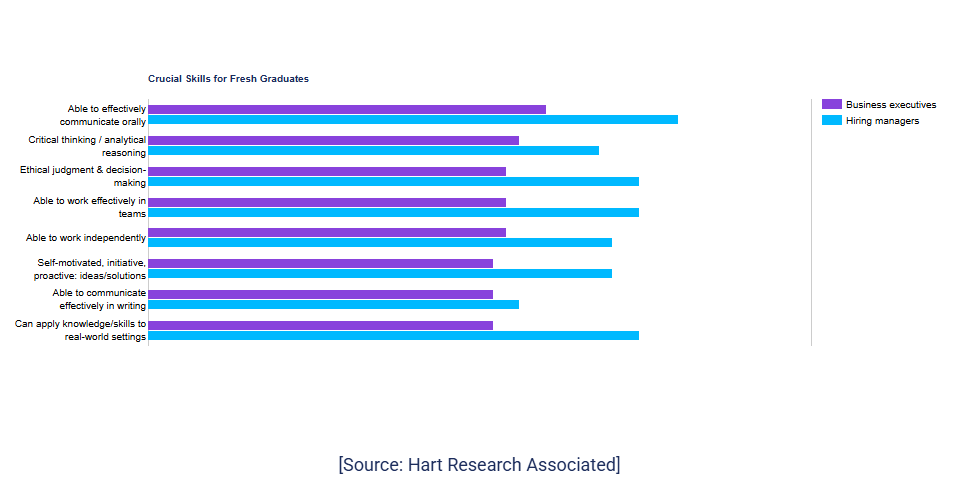
Knowing the next steps to take can help you prioritize, work more efficiently and respond with a well-thought-out strategy.
5. Customer Service Skills
In any business, there will be customers or clients. Having the aptitude to address their needs and keep them happy and satisfied is crucial to any role.
With this, you anticipate customers’ needs, actively listen and proactively resolve problems.
For restaurant jobs, you keep customers happy not just with the food but also with the overall service.
6. Interpersonal Skills
Interpersonal skills refer to harmoniously interacting and communicating with colleagues, clients and superiors.
Think of it as having the ability to get along with everyone — being the person people enjoy working with and having around.
Hiring managers love this trait because it means you’re not just an ace at your tasks; you’re also bringing some good energy to the team.
In addition to teamwork and collaboration, emotional intelligence (EQ) plays a crucial role in fostering positive workplace interactions.
This includes empathy, active listening, conflict resolution, and adaptability.
Employers value candidates who can navigate workplace dynamics with professionalism and emotional awareness.
7. Emotional Intelligence
Emotional intelligence is being aware of others’ emotions and managing your own.
With this, you can navigate conflicts more effectively and empathize with different perspectives.
You can also work toward solutions that consider everyone’s feelings.
Having emotional intelligence helps a Hotel Manager understand the emotions of staff and guests.
They can handle stressful situations and empathize with guests’ needs.
Having high emotional intelligence can also help you cope with stress and help colleagues when needed.
8. Project Management Skills
Project management skills are not just for project managers.
Being able to plan, execute and oversee tasks means you can achieve targets successfully.
A Waiter/Waitress, for example, should know how to prioritize tasks during a busy shift.
They ensure that orders are taken accurately and served on time.
Project management skills help in efficiently juggling multiple tasks.
9. Language Skills
The more languages you speak, the more people you can cater to.
This is especially relevant for hospitality roles where anyone from all over the world can be a guest or customer.
Being able to speak Spanish, for example, would be good if you’re working as a Hotel Concierge in Miami, given its large Hispanic community.
In fact, according to a report, 9 out of 10 United States (U.S.) employers express dependence on employees with foreign language proficiency.
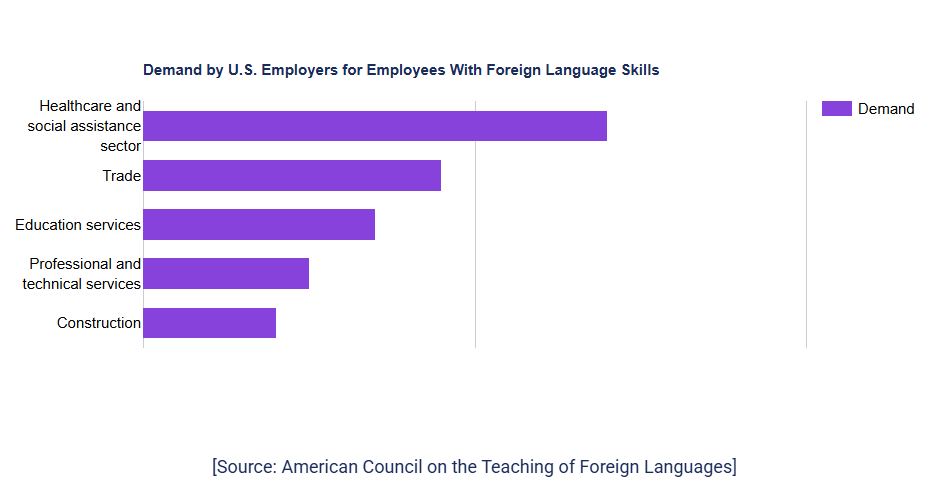
10. Data Analysis Skills
Knowing how to interpret and analyze data and derive meaningful insights from them can open more doors for you, career-wise.
In fact, a lot of companies and establishments require data analysis, even in restaurants.
A Restaurant Manager, for example, can use data to implement a dynamic pricing strategy.
Menu prices can be adjusted based on demand to potentially increase profits and customer satisfaction.
11. Leadership Skills
As an effective leader, you guide, inspire and influence others to achieve common goals.
You also demonstrate initiative, accountability and effective decision-making.
Keep in mind that leadership isn’t limited to those in management roles.
A Marketing Intern can show leadership by volunteering for tasks or using feedback as an opportunity to improve.
12. Attention to Detail
Attention to detail enables you to thoroughly and accurately complete tasks.
You demonstrate precision and diligence in handling information and executing responsibilities.
By proofreading emails or double-checking calculations, you show your commitment to high-quality work.
13. Time Management Skills
Effective time management involves prioritizing tasks, setting realistic deadlines and allocating time wisely.
This is especially important in fast-paced industries where deadlines are tight and demands are high.
Time management is not just about creating to-do lists. It’s also about outlining tasks and then accomplishing them within specific timeframes.
14. Research Skills
Research is the process of gathering, analyzing and interpreting information to get insights.
You can then use these insights to solve problems or make informed decisions.
To do this, hone your research skills, set objectives, diversify your sources and stay organized.
Note-taking and citation management will help.
15. Flexibility
Flexibility requires upskilling and a willingness to embrace new tasks.
You also have the ability to adjust to evolving work environments and requirements.
Hiring managers value this skill as it’s always more efficient when employees can easily adjust to the evolving needs of the business.
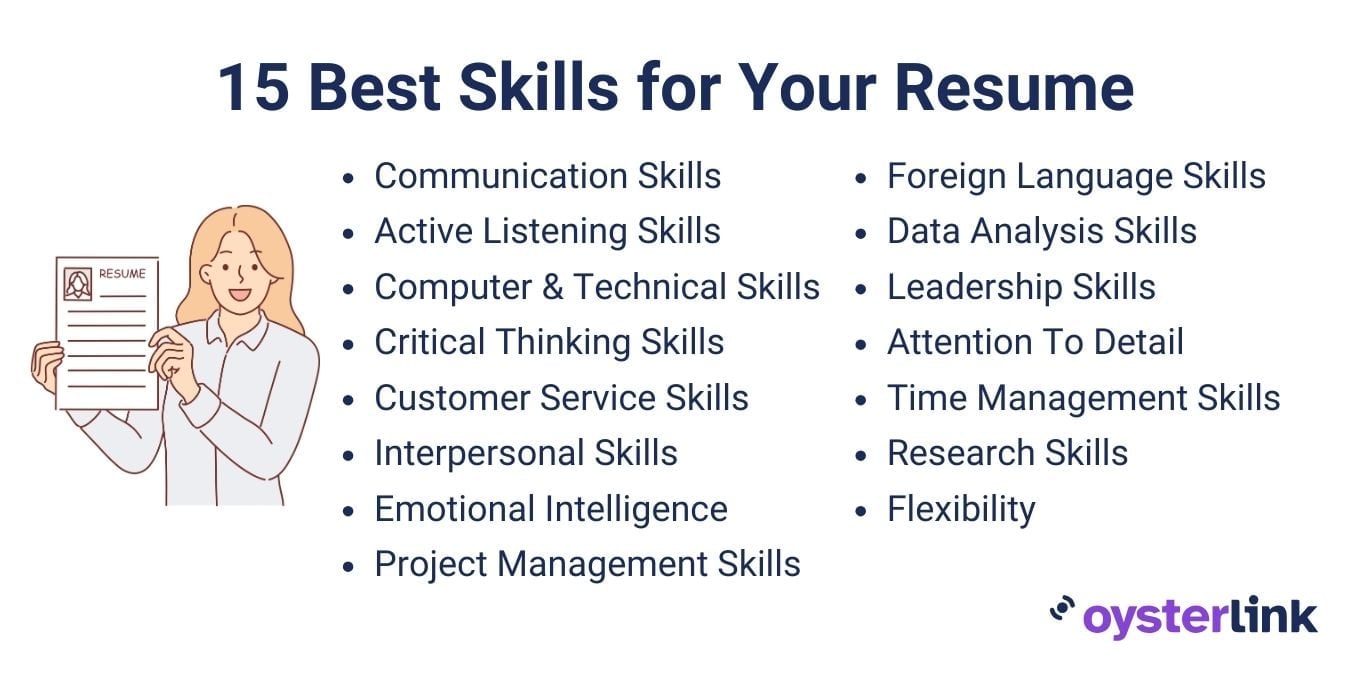
Soft Skills vs. Hard Skills: What’s the Difference?
When choosing which relevant skills to put on a resume, keep in mind that the skills section should have a combination of soft skills and hard skills.
Soft skills are personal attributes and interpersonal abilities that add to your effectiveness.
Examples include:
- Communication skills
- Active listening skills
- Critical thinking skills
- Customer service skills
- Interpersonal skills
- Emotional intelligence
- Leadership skills
- Attention to detail
- Time management skills
- Flexibility
Hard skills, on the other hand, are specific, teachable abilities or knowledge sets, often related to a particular job or industry.
Examples include:
- Computer and technical skills
- Project management skills
- Language skills
- Data analysis skills
- Research skills
Both soft skills and hard skills can be transferable skills that can enhance your overall employability.
Soft skills are often considered transferable as they can be applied across various roles and industries.
These skills also contribute to a positive work culture and effective collaboration.
On the other hand, hard skills are also transferable but are typically more specific to certain professions.
However, as industries evolve, having a strong foundation in hard skills can open up opportunities in related fields.
Skills to Put on a Resume by Job Type
Here’s a list of additional skills tailored for specific industries to help you fine-tune your resume.
- Administrative
- Calendar management
- Office Suite proficiency (Microsoft Office, Google Workspace)
- Data entry
- Organizational skills
- Multitasking
- Communication skills
- Accounting
- Financial analysis
- Budgeting
- Tax preparation
- Auditing
- QuickBooks
- Spreadsheet proficiency
- Customer Service
- Communication skills
- Conflict resolution
- Relationship building
- Customer service skills
- Time management
- Interpersonal skills
- Hospitality
- Guest services
- Reservation systems
- Event planning
- Language skills
- Upselling techniques
- Attention to detail
- Facilities
- Building maintenance
- Safety compliance
- Vendor management
- Space planning
- Quality assurance
- Problem-solving
- IT and Development
- Programming languages (Java, Python, C++)
- Software development
- System administration
- Troubleshooting
- Cybersecurity
- Database management
- Human Resources
- Recruitment and staffing
- Employee relations
- HRIS (Human Resources Information System)
- Training and development
- Conflict resolution
- Policy development
- Management
- Leadership
- Strategic planning
- Critical thinking
- Interpersonal skills
- Project management skills
- Performance evaluation
- Media
- Video editing
- Graphic design
- Social media management
- Content creation
- Media planning
- Storytelling
- Marketing
- Market research
- Brand management
- Digital marketing
- Content marketing
- Analytics
- Search engine optimization
- Sales
- Customer service
- Negotiation
- Sales forecasting
- Customer acquisition
- Customer relationship management
- Communication skills
- Retail
- Inventory management
- Point-of-sale systems
- Visual merchandising
- Customer service
- Loss prevention
- Sales techniques
Remember that the combination of soft skills and hard skills you put on a resume will either qualify or disqualify you for the job that you want.
Be sure to include some of these top skills on your resume for maximum results.
Best Skills for Resume in Restaurant Jobs
If you’re applying for a restaurant job, here are some of the most relevant skills to put on your resume.
- Customer service
- Communication
- Time management
- Interpersonal skills
- Flexibility
Subscribe to OysterLink for More Soft Skills and Resume Tips
With the number of resumes being sent out every day, you should do everything to stand out.
OysterLink offers personalized skill development tips based on job preferences and market trends. Check out our other articles on Career Advice.
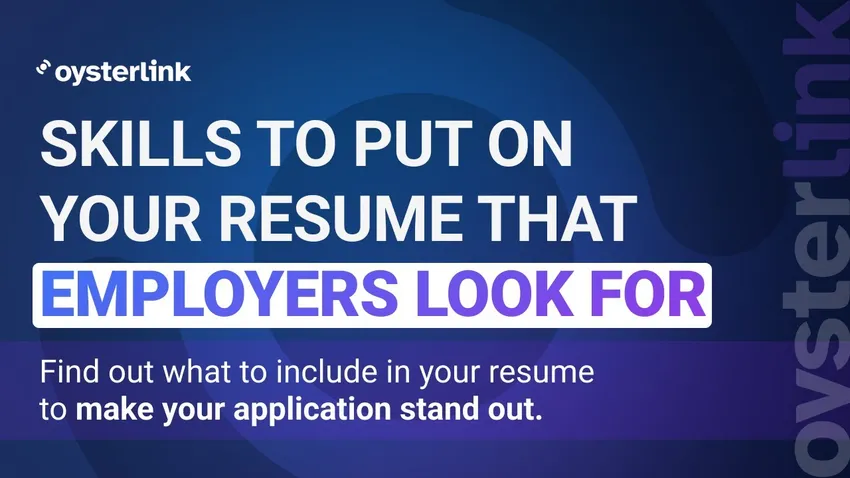







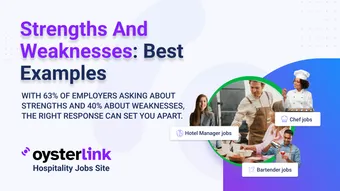
Loading comments...